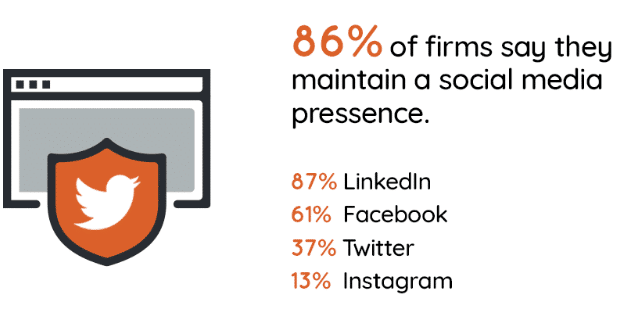Exploring the Pros and Cons of Social Media for Law Firms – Guest Post

In this digital era, businesses are under constant pressure to maintain an online presence to stay relevant. Over the last two years, the global pandemic accelerated this move. Not so long ago, a law firm’s website was considered a novelty. Now, in today’s digital age, a fully functional website is imperative for law firms to stay on par with their competitors and meet client expectations. The next possible step in this shift to the online world for law firms is embracing social media presence. However, is this shift toward social media a boon or a bane for law firms?
The Advantages Law Firms Stand To Gain From Social Media
While the clients seek support to represent them in the legal system, they need trustworthy, knowledgeable solicitors or attorneys or law firms with good reputations. Social media platforms allow law firms to display their best attributes, helping clients to make informed decisions when they opt for law firms or attorneys. According to Uptime Juris Page insights, 86% of law firms have a social media presence, and 45% of law firms use LinkedIn for B2B marketing endeavors. In this article, let us understand the pros and cons of social media for law firms.
- Fosters Brand Awareness
It is essential for law firms to create a sense of familiarity with their clients. Besides helping in establishing a connection with their clients it paves the way for trustworthy associations. It could be a game changer for law firms if they consider it a brand and not just a business.
A solid brand profile of a law firm on social media channels with its logo and contact details creates a unique identity for the law firm, allowing clients to recognize it quickly. The addition of a description in the bio and a few posts introducing the team members and partners breeds a sense of credibility on social media about the law firm, allowing clients to get to know the solicitors better.
- Aids In New Client Acquisition
Law firms can connect easily with prospective clients through various social media platforms. Social media presence gives law firms a higher chance of expanding their customer base. There are approximately 4.8 billion global social media users, representing 59.9% of the world population. Hence, if a law firm is present on social media, it offers clients an avenue other than email or telephone to reach out to them. As an average internet user spends about 151 minutes per day on social verse, law firms should capitalize on this remarkable opportunity and promote their services on social media for faster client acquisition.
- Establishes A Law Firm’s Domain Authority
The legal world is subjected to constant changes and updates of rules and regulations. Solicitors or law firms worth their salt are on top of such latest developments. By sharing such updates on social media platforms, law firms can provide valuable information to their clients and put their authority in the legal domain to display. For instance, law firms can share helpful information on social media platforms about the latest guidelines for misdemeanor penalties or county rules to help the general public be aware of any changes initiated in the legal system and behave as law-abiding citizens.
- Enhances Engagement
Law firms can use social media platforms to keep themselves fresh in their client’s minds for any future legal assistance. By making social media platforms an integral part of their relationship with their prospects, law firms can communicate, connect with their target audience, and transform them into loyal customers.
- Promotes Thought Leadership
Law firms can leverage social media platforms to create a good brand reputation by promoting thought leadership. By exchanging information, appropriate content, or views in relevant domains of law, they can position their law firm in a thought leadership position among their competitors and potential clients and enhance their reputation.
- Effective B2B Networking
Social media provides law firms an opportunity to check on their business contacts on a regular basis. They can respond to their reviews or share information, answer their queries, update them about the latest developments in the legal sector, and keep up with their clients. All these help law firms build a good relationship with their clients, creating a good word of mouth that ultimately paves the way for referrals.
- Generates Warm Leads
Social media platforms can work wonders by creating warm leads for law firms and increasing their user base. Prospects who visit a firm’s website after clicking from a social media account are already influenced by the firm’s services and will have a high probability of becoming their customer.
- Improves Search Engine Rankings
Law firms can host website content and articles relevant to the business domains they are vying to capitalize on. By sharing links to their blogs and articles on social media, law firms can influence their search rankings and make it easier for clients to discover them.
The Negative Impact Of Social Media On Law Firms
In this digital age, social media has become a part of our social fabric. It has blurred the distinction between personal and professional lives in specific scenarios, making it a tricky landscape for law firms to navigate. Here are some of the aspects of social media that have a negative impact on law firms.
- Consumes Valuable Bandwidth
Seeing success on social media takes meticulous effort. Law firms have to work with immense patience, post regularly, invest time, efforts and post regularly without getting disheartened to gain social media mileage for their brand. Solicitors in law firms are already stretched, and taking up such tasks might seem counterproductive and distract them from delivering their primary roles.
- Tackle The Burden Of Negative Engagement
A law firm’s reputation is heavily influenced by the way it engages with its clients and the public on social media. Any ill-judged remark or response from the law firm to a negative review can have far-reaching consequences with regulatory ramifications. Hence, law firms should be considerate and invest extra efforts while responding to a negative review, which tends to drain the law firm’s bandwidth.
- Unnecessary Trolling And Criticism
The social media audience is a tough crowd! In several scenarios, law firms tend to face criticism or trolling over social media platforms from individuals who are unversed about the rules and regulations of the legal system. It subjects law firms to unnecessary pressure of unjustified public opinions, deterring them from achieving their primary objectives.
Striking The Right Balance: The Must-have Social Media Guidelines For Law Firms
Law firms cannot ignore the importance of social media for their survival and sustenance. Hence, they need comprehensive guidelines to pursue the balancing act, i.e., maintain their presence on social media without any unnecessary ramifications. Law firms need complete guidelines to mitigate some legal and ethical concerns arising from social media presence. A social media policy for law firms will outline rules and set clear-cut expectations for attorneys associated with their services regarding behavior in the social verse. In this regard, even the ABA’s (American Bar Association) Model Rules of Professional Conduct specifies a code of conduct for attorneys while representing clients. Some of the guidelines law firms can adhere to avoid problems include the following:
- Avoid Breach Of Trust
Law firms should under no circumstance reveal any case details of the cases they represent on social media and abide by client confidentiality.
- Set Clear Standards
Law firms should lay the groundwork and set clear standards for all their employees. They should sensitize their employees about the importance of meeting the confidentiality guidelines and the repercussions they will face in case of policy violations.
- Undertake Thorough Fact-check
Law firms and their attorneys should undertake a complete fact check before posting any comments or sharing any information pertaining to legal systems on social verse to ensure that they do not end up misleading their clients or the general public.
- Avoid Topics That Trigger Ethical Concerns
A law firm should outline the type of social media content that is problematic and advise its attorneys from being vocal about such topics or posting anything related to them that can be considered legal advice.
- Take Full Charge of Messaging
Law firms should take full responsibility for the content hosted on their social media platform. The firm’s social posts messaging should be devoid of profanity and obscenity, as it reflects poorly on its image and destroys its reputation.
Wrapping Up:
Social media has become a necessary evil. No business can function without its help, and law firms are no exception. It has become an essential tool for law firms to communicate, build awareness, and acquire clients. With due diligence in place, law firms can overcome the negative impact of social media and leverage it to gain immense benefits.
Author Bio:
Shirley Stark currently working at InfoCleanse as a Marketing Team Lead. She Has hands-on experience in B2B marketing and loves to write blogs, tips, reading b2b articles, Creating Business strategies and traveling.



Recent Comments